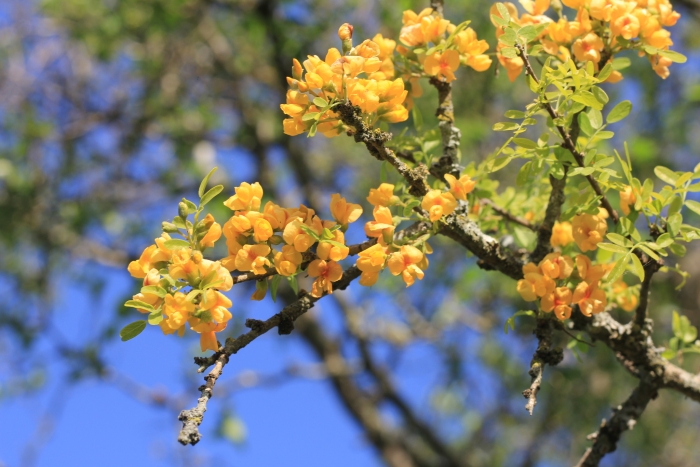Chilean Palo Verde
(Geoffroea decorticans)
Chilean Palo Verde (Geoffroea decorticans)
/
/

Romi Galeota Lencina
CC BY 4.0
Image By:
Romi Galeota Lencina
Recorded By:
Copyright:
CC BY 4.0
Copyright Notice:
Photo by: Romi Galeota Lencina | License Type: CC BY 4.0 | License URL: http://creativecommons.org/licenses/by/4.0/ | Rights Holder: Romi Galeota Lencina | Publisher: iNaturalist | Date Created: 2021-10-09T08:41:27-07:00 |
































Estimated Native Range
Summary
Geoffroea decorticans, commonly known as Chilean Palo Verde, is a deciduous tree native to the arid and semi-arid regions of Southern South America, particularly in Argentina, Bolivia, Paraguay, and Chile. It typically grows up to 8 meters (25 ft) tall and is adapted to desert conditions, thriving in areas with well-drained soils. The chañar is both cold and drought deciduous, shedding its leaves in winter and possibly in summer if conditions are extremely dry. This species is deeply embedded in local culture and folklore due to its striking appearance, ease of propagation, and historical medicinal uses.
Chilean Palo Verde is notable for its upright, spreading canopy and trunks that can be straight or mildly curving. Mature trees exhibit a sculptural quality with long, irregular ridges and valleys on their trunks and branches. The bark peels off in large flakes, transitioning from tan to brown before revealing the dark green, younger trunk underneath. This bark shedding creates a visually appealing, puzzle-piece pattern. The tree’s small, papery, yellow flowers are very visible and bloom in spring, either singly or in clusters, adding to its ornamental value. It is often used in xeriscaping and as an ornamental tree in areas with similar climates to its native habitat. Geoffroea decorticans grows best in full sun and requires low to medium amounts of water, making it suitable for water-conservative gardens. It is hardy in USDA climate zones 8b to 10 and can withstand short frosts down to –13 °C, as well as high temperatures exceeding 40 °C. However, gardeners should be aware that it may require protection from prolonged frost and that it can spread if conditions allow.CC BY-SA 4.0
Chilean Palo Verde is notable for its upright, spreading canopy and trunks that can be straight or mildly curving. Mature trees exhibit a sculptural quality with long, irregular ridges and valleys on their trunks and branches. The bark peels off in large flakes, transitioning from tan to brown before revealing the dark green, younger trunk underneath. This bark shedding creates a visually appealing, puzzle-piece pattern. The tree’s small, papery, yellow flowers are very visible and bloom in spring, either singly or in clusters, adding to its ornamental value. It is often used in xeriscaping and as an ornamental tree in areas with similar climates to its native habitat. Geoffroea decorticans grows best in full sun and requires low to medium amounts of water, making it suitable for water-conservative gardens. It is hardy in USDA climate zones 8b to 10 and can withstand short frosts down to –13 °C, as well as high temperatures exceeding 40 °C. However, gardeners should be aware that it may require protection from prolonged frost and that it can spread if conditions allow.CC BY-SA 4.0
Plant Description
- Plant Type: Tree
- Height: 20-30 feet
- Width: 20-30 feet
- Growth Rate: Moderate
- Flower Color: Orange, Yellow
- Flowering Season: Spring
- Leaf Retention: Deciduous
Growth Requirements
- Sun: Full Sun
- Water: Low, Medium
- Drainage: Medium
Common Uses
Bee Garden, Bird Garden, Butterfly Garden, Edible*Disclaimer: Easyscape's listed plant edibility is for informational use. Always verify the safety and proper identification of any plant before consumption., Low Maintenance, Potted Plant, Showy Flowers
Natural Habitat
Native to arid and semi-arid regions of Southern South America
Other Names
Common Names: Chañar, Kumbaru
Scientific Names: , Geoffroea decorticans, Geoffroea spinosa, Gourliea decorticans, Gourliea spinosa, Gourliea chilensis, Geoffroea decorticans var. decorticans, Gourliea decorticata, Lucuma spinosa,
GBIF Accepted Name: Geoffroea decorticans (Gillies ex Hook. & Arn.) Burkart